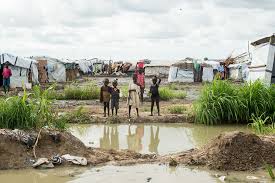From the United Nations Mission in South Sudan’s (UNMISS) base in Bentiu, adjacent to country’s largest internally displaced persons camp, the remnants of a once vibrant forest stretch in every direction.
What used to be lush with vegetation and wildlife only four years ago is now a grey, watery landscape, the legacy of catastrophic floods since 2021.
However, a glimmer of green is returning, thanks to the ‘Green Bentiu Initiative,’ actioned by Blue Helmets from Pakistan.
The project aims to restore some of what the relentless flooding destroyed, and an impressive 500 native trees have already been planted.
Now the initiative is spreading its roots, from humble beginnings inside a Pakistani engineering compound in the UNMISS Field Office to greater Unity State and Ruweng Administrative Area.
Among the equipment dispatched to remote UNMISS operating bases, Pakistani peacekeepers have been carefully stowing away saplings. Recently, 15 trees were delivered to a Mongolian base in Abiemnom, and 40 trees were planted in a small ceremony at the local Rubkona Airfield with the help of peacekeepers from various countries.
Captain Taimoor Ahmad, a Pakistani peacekeeper who helped organize the airstrip event, insists his contingent’s plans don’t stop here.
“Next, we are going to invite the local community to join us. Our goal is to plant fruit-bearing trees and orchards in areas where communities live so they can benefit from them in the years to come,” he said.
Handing our reporter a shovel, he added, “There are nearly 3,000 peacekeepers here [in Bentiu], and we want each one to plant their own tree.”
Restoring local flora and fauna has multiple benefits. During the wet season, the trees help absorb excess water, reducing flood risks. In the dry season, when extreme heat prevails, they provide much-needed shade for birds and animals, creating a more hospitable environment.
If planted strategically, trees can even help strengthen the 120 km of dykes that Pakistani peacekeepers erected in 2021 to protect hundreds of thousands of people sheltering in Bentiu’s internally displaced persons camp and surrounding areas.
Walking through the burgeoning green spaces within the Pakistani base, Major Hina Nasser, an UNMISS peacekeeper responsible for a respectable three-metre-high, year-old tree, reflected on the long-term impact of their efforts.
“Our goal is to leave an enduring legacy. We may be rotating out soon, but these trees will remain, helping to restore what was lost,” she said with a smile.
The current rotation of Pakistani engineers is set to return home after more than a year in service of peace, but their successors are already prepared to continue and expand the Green Bentiu Initiative. Along with an eager contingent of new peacekeepers, the lasting goal is for the community to take ownership of the initiative and build back a better, greener Bentiu.
Courtesy APO


